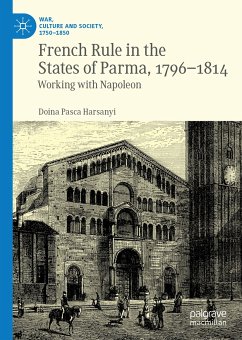"This scholarly and nuanced account of the lands of the Duchy of Parma in the Napoleonic era ranks with major works by Carlo Zaghi, Livio Antonielli, and Michael Broers in brilliantly illuminating the still contested era period of French domination in Italy. Harsanyi describes the evolution of a system that was vicious, grasping, capricious and always underpinned by the French occupiers' conviction of their own cultural superiority, which could legitimate pretty much anything from the systematic theft of art to the imposition of conscription. Yet she also brilliantly shows how the French presence was fl exible, modernising, and brought positive and progressive reform. Harsanyi reveals a story of the pragmatic collaboration of local élites, based on career and stability rather than affection or ideology, who were skilled at tweaking French directives to their own ends. While French exploitation could trigger insurrection and resistance, French offi cials on the ground often displayed remarkable good sense. This brilliant book tells us not just about Parma and the wider Italian situation in the period of French domination, but about the very nature of empire." -David Laven, University of Nottingham, UK
This book addresses the interplay between collaboration and resistance during the Revolutionary/Napoleonic era in the Duchies of Parma, Piacenza and Guastalla, renamed States of Parma in 1802 and Department of Taro in 1808. Considered no more than a docile backwater in 1796, the country exploded in violent rebellion at the end of 1805, to the astonishment of the French imperial establishment and of Napoleon himself. Yet, the insurgency - duly suppressed by the French military - did not beget further confrontation. French administrators determined to demonstrate that the empire was a force for good and local citizens compelled to reassess their circumstances realistically settled for cooperation in the form of protracted give and take arrangements. In recounting the events, this book highlights local agency and the myriad ways Parma's population harnessed the power of empire to shape what eventually became the Napoleonic legacy in the region.
Doina Pasca Harsanyi is Professor of History at Central Michigan University, USA. Her previous publications include Lettres de la duchesse de La Rochefoucauld à William Short (2001), Lessons from America: Liberal French Nobles in Exile, 1793-1798 (2010), and numerous articles on French-American and French-Italian subjects.
Dieser Download kann aus rechtlichen Gründen nur mit Rechnungsadresse in A, B, BG, CY, CZ, D, DK, EW, E, FIN, F, GR, HR, H, IRL, I, LT, L, LR, M, NL, PL, P, R, S, SLO, SK ausgeliefert werden.









